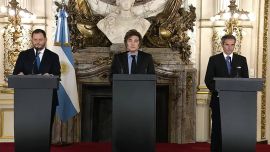Argentina’s ruling party for decades, Peronism today cannot even take a monopoly of the opposition for granted, as some of this month’s developments are underlining. While Peronism distracts itself with the courtroom farce of Luis Barrionuevo’s Justicialist Party trusteeship, some of the most effective opposition these days has been coming from within government ranks, as the maverick Civic Coalition deputy Elisa Carrió and the Radicals pressure the Mauricio Macri administration into staggering its steep household gas bill increases. While Carrió’s cosy relationship with Macri makes her harmless as far as the executive branch of government is concerned, Carrió’s vehement confrontations with the judicial branch also give her a strong opposition profile on that front.
Such gambits would not matter too much if the opposition were observing a normal momentum but in this context the inexplicable Barrionuevo trusteeship issue becomes more than a bad joke. Nobody seems to understand how Federal Judge María Romilda Servini de Cubría could think of entrusting the Justicialist Party to a controversial trade unionist notorious for burning ballot-boxes when running behind in the 2003 Catamarca gubernatorial elections and for saying that nobody makes money working in Argentina, but the issue goes beyond listing Barrionuevo’s multiple defects. In the last couple of years with the electorate indicating in two successive elections that it wanted a rest from Kirchnerism, the alternative to Macri has often been sought in so-called ‘rational Peronism’ (looking especially to its governors and senators). But with the Barrionuevo travesty this option of traditional Peronism has pressed a massive self-destruct button.
If Kirchnerism is already past its shelf life, how much more historic Peronism with all its accumulated baggage of decades of national frustrations? But nature abhors a vacuum. Rather than flogging a dead horse, surely the time has come to look ahead to the creation of a new alternative instead of going ever further back in history. This suggestion should not be confused with anti-Peronism – there is no need to consign its heritage to oblivion because just as the Radicals (a much older party, predating the birth of Juan Domingo Perón by a few years) continue within Macri’s Cambiemos (Let’s Change) ruling coalition, so a Peronist wing would not be out of place within a new opposition alliance.
Yet Peronism should not aspire to being the cornerstone of opposition unification because in many ways it only has itself to blame for the current fragmentation. The many years in government have come at the price of identity. By implementing neo-conservatism in the last decade of the previous century and leftist populism in the first decade of this, Peronism has shown its readiness to play both ends in its quest for power. Yet this ambivalence has at least two dangerous consequences – firstly, it becomes very difficult to maintain a united electorate while adopting two such diametrically opposite courses within living memory, and secondly, adopting drastically differing economic policies and ultimately failing with both limits credible offers for the future. All the more reason to start again.
For some, Peronism may have hit rock bottom with the farce of the Barrionuevo trusteeship but others might argue that if it could survive the total catastrophe of the 1974-6 Isabel Perón presidency and the 1983 electoral defeat, it can survive anything. But politics should not be seen as the art of survival – it is the art of government and a historic ruling party needs to raise the bar more than anybody.


















Comments